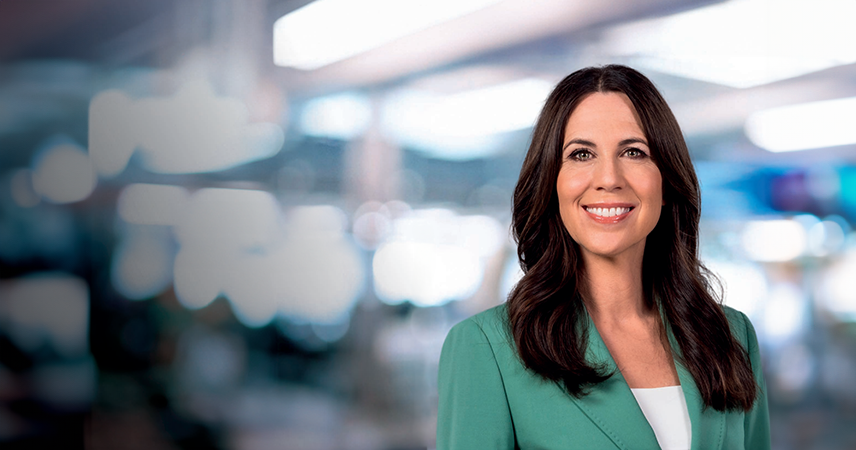
Susanne Wille is a familiar face to many Swiss citizens, having been political anchor and a journalist for the German language TV broadcast channel SRF. She has become less visible, but more influential, having been named as the first female Director-General of the Swiss Broadcasting Corporation. She has overall responsibility for broadcasting for the whole nation in its four languages – French, German, Italian and Romansh.
“I had leadership positions while I was still working in the newsroom and I got to the point where I thought: I just love being responsible for the company”
An early ambition was to work for the Red Cross and one can see in this the desire both to have an impact, and to ensure that this would include a social dimension. Recalling her international reporting work, she talks movingly of having met a young Iranian girl who wanted to become a teacher, whose family did not support her ambition; and of the harsh lives of people living in rural Siberia.
Stepping up from the newsroom to the executive office is clearly something for which she has aptitude, but does she miss the journalism? “I really had a great first career. I could travel the world with reports in Russia, Brazil, Iran, everywhere. I did all the political anchor shows, elections around the world… at the same time I had leadership positions while I was still on screen and then I got to the point where I thought: I just love being responsible for the company.”
She chose an EMBA not just for personal leadership skills, but for a comprehensive education on all aspects of executive business abilities. “I really wanted to go outside my company to, on the one hand, strengthen my skills and get a larger toolbox, but also get inspired by other industries because we have similar problems.”
In addition, she understands the importance of, to use the German word Reflexionsraum – or “room for reflection and feedback”, which involves “challenging myself, for going on a path of getting to know myself”. The more senior the executive position “the less you get really blunt feedback”. Self-awareness, in turn, helps the leader get the best out of the abilities of her team.
As a linguist and historian by academic background, she is atypical on an EMBA course, where many on the cohort have a background in engineering, finance or law. She relished the opportunity to study with people of different nationalities and professional backgrounds.
There are similarities as well as differences. The fact-checking in history or in journalism is – or at least should be – as rigorous as any audit of a financial account or project update in engineering. She says of her academic background as historian: “It teaches you to be precise with sources. It teaches you to question realities. It teaches you critical thinking. And it also teaches you to think in the long term. You only understand the present if you know the past.”
Grasping the importance both of data and dominant narratives is essential to an executive, especially in modern media. A media company today has to be “ambidextrous”, she says: able to maintain the format and disciplines of a responsible broadcaster in the core business, while engaging in the future business, in digital transformation – an area in which she has held leadership positions prior to her appointment as Director-General of the SBC. “We still have television and radio and people love it, and we have a strong reach. But we see the changes and they are fast.”
When she was anchor on the 10pm news she would get feedback on the tram the following morning. Nowadays, newsfeed and feedback are instant. The rise of social media and of disinformation powered by algorithms is relentless. Mainstream broadcasting media have to compete in the digital space without compromising quality. Everything becomes more hi-tech – even fact-checking, for example to establish whether a photograph is genuine. Broadcasters have had to invest in “fact-checking networks”. The SBC also engages in educational talks for schoolchildren on how to detect fake news.
Studying for the EMBA, she has found, has primary, secondary, and tertiary effects that last into your career. For example, learning about finance deepened her knowledge of accounting principles, helping her ask the right questions of the CFO. The education also enhances mental dexterity. In turn this can help you develop empathy.
Leaving your comfort zone to learn something unfamiliar, she says, “is something that you expect from your employees. I am a leader of change. If you work in media, you change the business model. You change the strategy. You always have to lead people, and you expect them just to try
out something you’ve never tried out.”
Switzerland is a vibrant democracy, and reporting from different regions helped Susanne understand that these freedoms are not universal. This underlines the importance of national media with integrity – a democracy simply ceases to function without access to reliably accurate information on political, social, environmental and technological matters, where false or inaccurate narratives can gain traction.
The SBC reaches 83% of the population through TV and radio, and online.
Susanne is still becoming accustomed to the term “Director General”, which she feels has a somewhat “top-down” ring, considering her leadership style is participative; but one would not want her to dilute the status, or diminish her achievement. Many individuals in Switzerland, male and female alike, have welcomed her elevation. It is a leading role, and not just for one company.
“We still have television and radio and people love it, and we have a strong reach. But we see the changes and they are fast.”


